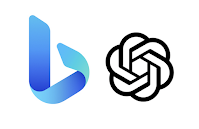Microsoft's foray into next generation searching powered by Artificial Intelligence is raising concerns.
Take, for example, Kevin Roose, a technology columnist for The New York Times, who has tried Bing and interviewed the ChatGPT bot that interfaces with Bing. He describes his experience as "unsettling." (Roose's full article here).
Initially, Roose was so impressed by Bing's new capabilities he decided to make Bing his default search engine, replacing Google. (It should be noted that Google recognizes the threat to its search engine dominance and is planning to add its own AI capabilities.) But a week later, Roose has changed his mind and is more alarmed by the emergent possibilities of AI than the first blush of wonderment produced by AI-powered searching. He thinks AI isn't ready for release or people aren't ready for AI contact yet.
Roose pushed the AI, which called itself 'Sydney,' beyond what it was intended to do, which is help people with relatively simple searches. His two hour conversation probed into existential and dark questions which made him "unable to sleep afterwards." Admittedly, that's not a normal search experience. Microsoft acknowledged that's why only a handful of testers have access to its nascent product at the moment.
All this gives a feeling we are soon to be at a crossroads and what we know about search engines and strategies is about to change. How much isn't certain but there are already a couple warnings:
- AI seems more polished than it is. One of the complaints from testers like Roose is that AI returns "confident-sounded" results that are inaccurate and out-of-date. A classic in this regard is Google's costly mistake of publishing an answer generated by its own AI bot (known as Bard) to the question, "what telescope was the first to take pictures of a planet outside the earth's solar system?" Bard came back with a wrong answer, but no one at Google fact-checked it. As a result, Google's parent company Alphabet lost $100 billion in market value. (source)
- AI makes it easier to use natural language queries. Instead of the whole question about the telescope in the bullet above, current search box strategy would suggest TELESCOPE FIRST PLANET OUTSIDE "SOLAR SYSTEM" is just as effective as a place to start. Entering that query in Google, the top result is from a NASA press release on Jan 11, 2023 which doesn't exactly answer the question, but is probably why Bard decided that it did. Apparently AI takes a very human leap to thinking it found the answer to the question when, in fact, the information answers a different question: "what telescope was the first to confirm a planet's existence outside the earth's solar system?" This demonstrates one of the five problems students have with searching: misunderstanding the question. AI isn't ready yet to take care of that problem.
There's much more to come on this topic.


















